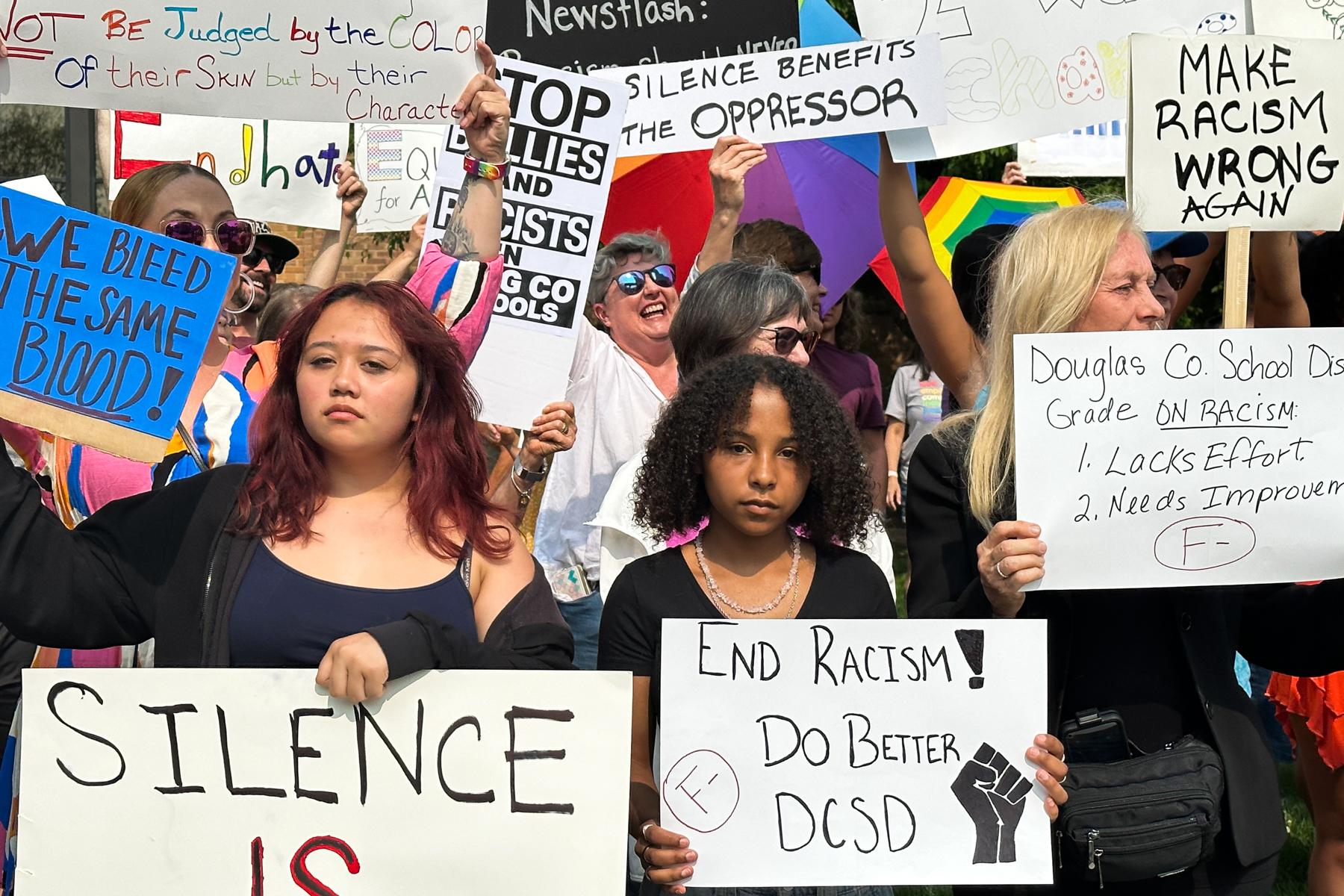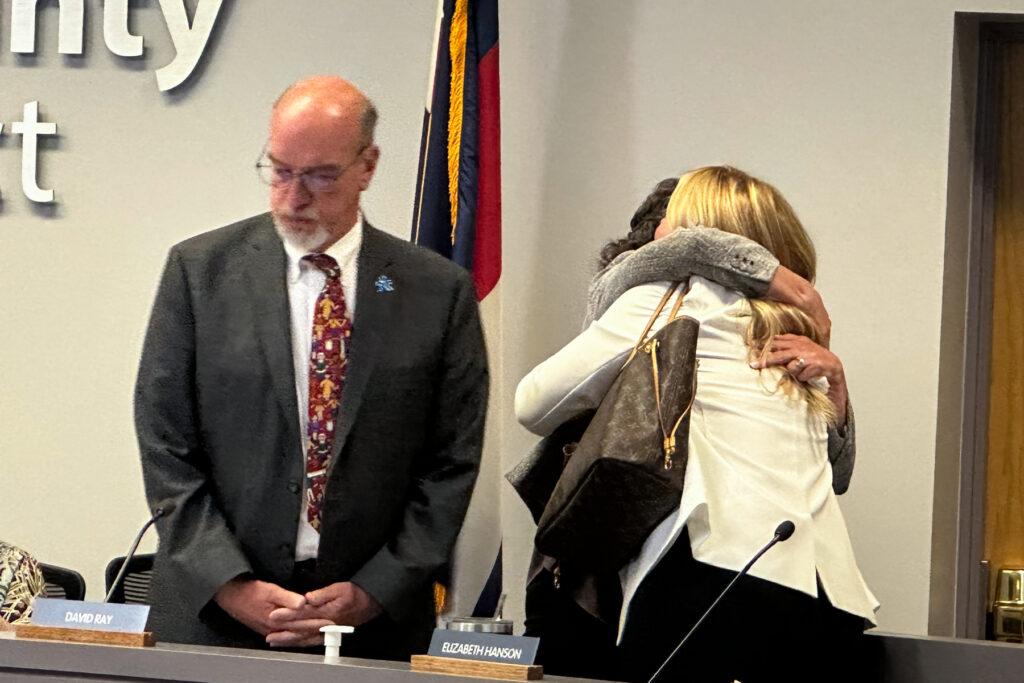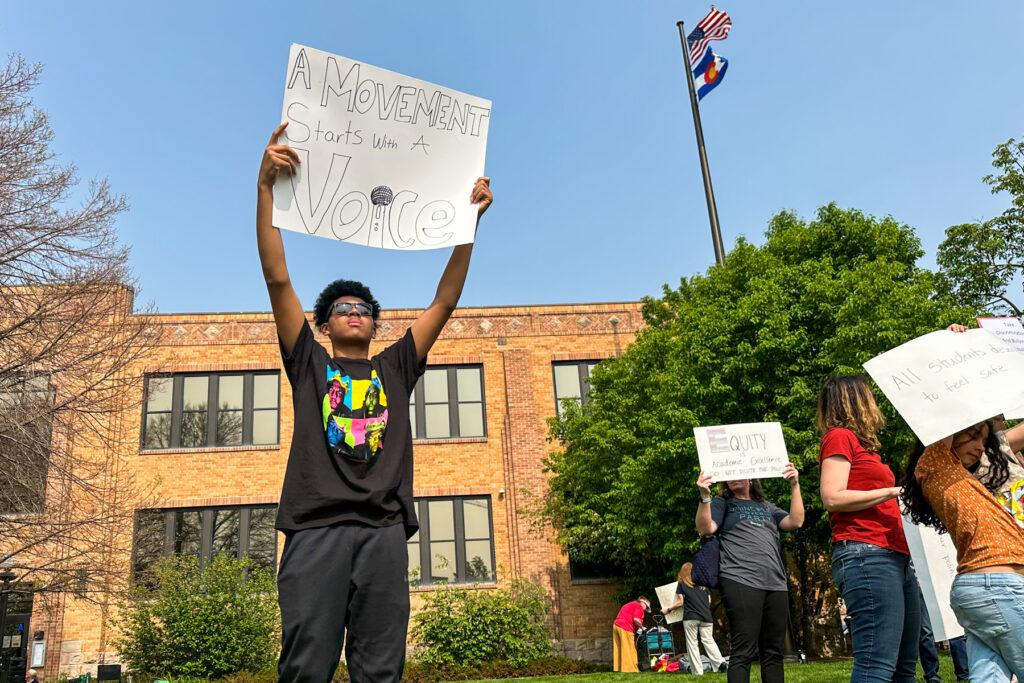
After more than a year of tumult and controversy, the Douglas County School Board passed on a 4-to-2 vote a revised equity policy board members say strikes a compromise on a polarizing issue.
At the Tuesday night meeting, some parents and students, however, feared it would dilute district efforts to make all students feel welcome at school. Meanwhile, scores of other community members called for eradicating the equity policy altogether.
Board member Kaylee Winegar said when she assumed office, she wanted to repeal and replace the policy, feeling that it did more harm than good. But she understands that others feel differently.
“I think the revisions in place keep the good and bring clarity and certainty to the concept that we as a district do not intend to elevate certain ideals and beliefs over others,” she said.
The policy, swept up in a national furor over misinformation about critical race theory, was a key reason the new board majority was elected in 2021. On the other hand, the fact that it wasn’t implemented was one reason some voters rejected a critical school tax measure on the ballot in 2022.
The action on the equity policy came hours after a rally against racism outside district headquarters and a board discussion about statistics showing large gaps between different racial and ethnic groups in dropout rates, bullying, and discipline rates. Working until past 2 a.m. Wednesday, the board signed off on a number of other policies at a meeting that began with one board member, Elizabeth Hanson, resigning.

Possible changes to the equity policy roil community
The equity policy described how the district should manage equity and diversity issues. It was designed to fix inequitable practices in the district, ensure all student groups are represented in the curriculum, and that the district has a diverse teacher workforce.
An equity policy was adopted by the school board in March 2021 after years of discussion and input from a number of groups. But the implementation of the policy stalled in January 2022 when a new board majority introduced a resolution directing then-Superintendent Corey Wise to recommend potential changes to the equity policy. Before he could do that, Wise was fired.
On March 28, new Superintendent Erin Kane announced she did not have any recommended changes to the equity policy. Data from surveys of parents, community members, teachers and students backed up the recommendation to keep the equity policy in its current form.
But board public comment sessions were fiery with dozens of community members speaking against the equity policy and dozens supporting it.
Board president Mike Peterson announced last month he was proposing revisions to the equity policy. It took many by surprise because there had been no board direction to do so. Peterson said he wanted to clear up ambiguity, define equity and set specific goals.
“DEI policies, while they may be well intended, in my opinion, sometimes can be incredibly mis-implemented ... We don’t want to get it wrong in Douglas County,” he said Tuesday.
The revisions keep much of the original policy but add a lot of new language.
The revisions passed Tuesday night expand the definition of diversity from aspects of individual identity such as race and color and gender, to include cognitive diversity and instrumental diversity. (Instrumental diversity is described as “strength in collaboration among individuals possessing different skills, specialties, plans and techniques to pursue common, agreed upon goals.”) Personality and learning approach diversity had been considered.
Critics of changing the equity policy say adding diversity definitions dilute the importance of identity diversity and reduce the need to actively support individuals’ identities.
“Where do you stop? Let’s talk about social diversity, physical diversity, athletic diversity. I mean, we could go on and on and on and on,” said board member David Ray. “We’re losing sight of the reason for this policy. The reason for this policy is that we are in a system that continues to marginalize those who have been historically marginalized. And that's the problem.”
But other board members were adamant that just focusing on identity puts “people into bins” and risks people thinking their group identity defines them.
“I don’t know how you dilute a policy by just including more people,” board member Christy Williams said.
The board did compromise. The revisions restored some phrases that had been previously deleted, including “diversity, equity and inclusion” as an outcome. They also restored that the district will implement “unbiased, culturally relevant, responsive and sustaining” learning environments.
The two members who voted against the policy said the entire process for revising the equity policy was deeply flawed. Equity experts on staff weren’t consulted about the proposed revisions, which came from one board member Mike Peterson, and the revised draft was made public even before other board members saw it.
“We’re basically rewarding this precedent that says that a process can violate all the norms of good quality decision-making, but by God, we’re going to go ahead and push this through,” said Ray.
Board member Susan Meek said she didn’t see how the original policy “was lifting up some students and pushing down others.”
“I don’t see that in the original policy,” she said. “The policy talks about each and every student.”
Data show big racial gaps
Susan Meek said data underscores the need for a strong, focused equity policy to address racism and discrimination, and disproportionate disciplining.
Despite data showing large gaps between student groups, results of a climate survey from the fall of 2021 were originally placed on the board’s consent agenda, meaning board members don’t discuss the item. Meek said she found that “astounding” and removed the monitoring report from the consent agenda.
“As a board, it is our job to hold the system accountable,” said Meek.
The survey showed 71 percent of white students felt they belonged at their school while only 56 percent of Black students did. Fourteen percent of white students said they’d been bullied on school property during the past 12 months, while 24 percent of Black students did.
But the gaps were even greater in another area. Forty-one percent of Black students were disciplined versus 16 percent of white students. Nearly half of youth in truancy court in Douglas County are students of color, she said. Fifty-three percent of the district’s dropouts are Latino, yet the group makes up just 16 percent of the district.
Meek asked Superintendent Kane what type of training is happening to prevent racism from occurring and to alleviate systemic racism.
She responded that the district is working on training in a multi-year implementation plan. Kane said low numbers of certain student groups feeling like they don’t belong isn’t acceptable and the district is “working on getting to the bottom of those numbers.”

Rally against racism
Just hours before the school board meeting, parents and students rallied outside district headquarters, calling for action from district leaders on racism in schools — and a better response to a biracial student who was the target of racial slurs.
The protest was organized by Castle Rock parent Melissa Sutherland and her high school son who were upset after hearing about what happened to Jeramiah Ganzy, a student at Castle Rock Middle School. A Snapchat group with dozens of students called for the genocide of Black people, threatened to shoot them and called for bringing back the Holocaust. Ganzy was also repeatedly subjected to racial slurs at school.
Frustrated, the 14-year-old reported the racism he was experiencing to district officials in an email but no one contacted him. When students learned Ganzy showed the images to his mother who reported them to the school, students threatened to lynch the boy, according to his mother.
Sutherland said the school district needs to communicate to the public what it’s doing to prevent racist incidents at school.
“They need to know that just saying that you're against racism is not enough. You need to follow through with actions.”
She also wants teachers to be educated in how to take actions seriously and education for students.
“Some students don't even realize the harm they're doing,” she said.
Lacey Ganzy and her son Jeramiah attended Tuesday’s rally.
Jeramiah said the past few weeks have been hard. He’s finishing school online.
“My social circle's been basically closed and I just feel a little alone now that I can't have contact with some of my close friends.”
Friends have set up a GoFundMe to support the family as it searches for a place to live outside of the county. Jeramiah said he’s looking forward to going to a more diverse school. He also wants to see change in Douglas County.
“I want them to be taught about Black history. I want them to have absolutely no tolerance for any sort of discrimination of any kind. I want teachers to be actively looking for this kind of discrimination and to know how to better deal with it.”
The family is expected to file a civil rights lawsuit in federal court.
At the board meeting, Kane addressed the issue.
"I want to express again how very sorry I and all of the district are that we had family experience racial remarks made by another student,” the superintendent said. “Racism in any form is unacceptable at DCSD and a direct policy violation."
She said multiple students were suspended. Officials said Castle Rock Middle School students participated in harassment and bullying presentations and district leaders are working with the school on other behavior strategies for next year.








